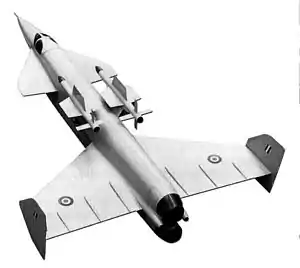Vickers Type 559
The Vickers Type 559 was a supersonic interceptor aircraft design by the British aircraft company Vickers-Armstrongs and was their submission for Operational Requirement F.155 in 1955.
| Type 559 | |
|---|---|
 | |
| Role | Interceptor |
| Manufacturer | Vickers-Armstrongs |
| Number built | None |
It was not accepted for further consideration; the most valued submissions being from Armstrong Whitworth and Fairey, however the F.155 requirement was dropped as a result of the 1957 Defence White Paper.[1]
Design and development
The Type 559 was an unorthodox canard design with a massive chin air intake, split vertically, for two reheated de Havilland Gyron engines of 20,000 pounds-force (89 kN) thrust each, placed as in the English Electric Lightning, one above the other. Two de Havilland Spectre Junior rockets were situated each side of the fuselage at wing level. Two Red Hebe or Blue Jay missiles were mounted alongside the upper part of the fuselage between the canard and the mainplane, which had endplates incorporating twin rudders.
Specifications
Data from Supermarine Aircraft since 1914 [2]
General characteristics
- Crew: 1
- Length: 68 ft 3 in (20.80 m)
- Wingspan: 42 ft 0 in (12.80 m)
- Height: 15 ft 3 in (4.65 m)
- Wing area: 615 sq ft (57.1 m2)
- Empty weight: 41,485 lb (18,817 kg)
- Gross weight: 62,190 lb (28,209 kg)
- Powerplant: 2 × de Havilland Gyron PS.26/1 afterburning turbojet engines, 20,000 lbf (89 kN) thrust each dry, 27,000 lbf (120 kN) with afterburner
- Powerplant: 2 × De Havilland Spectre Junior Kerosene/High-test peroxide rocket motor, 5,000 lbf (22 kN) thrust each
Performance
- Maximum speed: Mach 2.5
- Combat range: 150 mi (240 km, 130 nmi)
- Endurance: 32 minutes
- Service ceiling: 60,000 ft (18,000 m) specified by F.155
Armament
Notes
- Buttler 1996, p.73.
- Andrews and Morgan 1987, p.309.
References
- Andrews, C.F. and E.B. Morgan. Supermarine Aircraft since 1914. London:Putnam, 1987. ISBN 0-85177-800-3.
- Butler, Tony. "Futile Rivals: F.155T - The Quest for "An Ultimate in Interceptors"". Air Enthusiast, No. 61, January/February 1996. Stamford, UK:Key Publishing. ISSN 0143-5450. pp. 65–73.
- Buttler, Tony. British Secret Projects: Jet Fighters Since 1950. Leicester, UK: Midland Publishing, 2000, ISBN 1-85780-095-8.
External links
| Wikimedia Commons has media related to Vickers Type 559. |